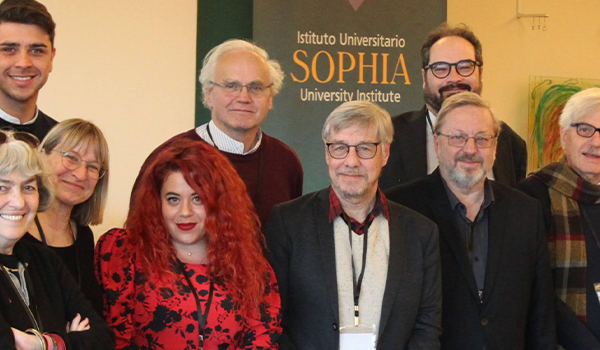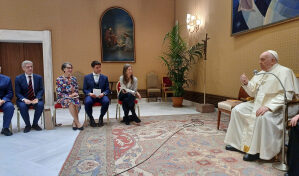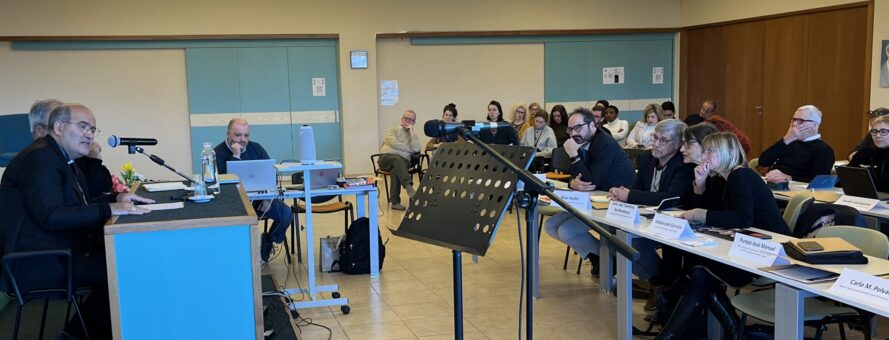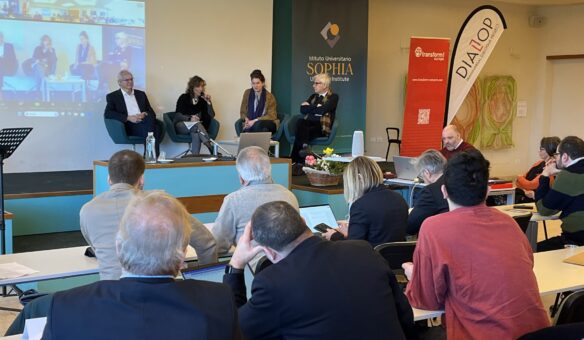Dialop: “Courage and commitment to dream of a better world”.

An audience with Pope Francis on Wednesday 10 January followed by three days of reflection at the Conference on Integral Ecology at the Sophia University Institute in Loppiano. Two fundamental stages on the path of dialogue between Catholics and Marxists on important issues, beginning with peace.

Even though they were just small signs, they are so significant as to consider Dialop’s path as a sort of well-respected special observer on the part of the Catholic Church. The initiative – which began in 2014 – to foster dialogue between Christians and Marxists – experienced a significant moment on Wednesday, 10 January with a private audience with Pope Francis. It was meant to be a ten-minute greeting which would already have been a valuable achievement but Bergoglio spent 40 minutes with the delegation (eight Catholics and seven Marxists).
‘In a world divided by war and polarisation,’ the Pope began, ‘don’t back down, don’t give up, don’t stop dreaming of a better world’, because ‘it has been precisely the great dreams of freedom and equality that have produced breakthroughs and progress’. And he recommended “three attitudes”. First, ‘Have the courage to break the mould to open up, in dialogue, to new paths. Let us cultivate a spirit of encounter and listening with an open heart, excluding noone at a political, social and religious level’. Then, ‘Care for the weak. A civilisation can be ‘measured’ by how it treats its most vulnerable citizens. Politics that is truly at the service of people cannot allow itself to be dictated by finance and market mechanisms’. Finally, ‘Legality. What we have said so far implies a commitment to fight the scourge of corruption, abuse of power and illegality’. And in the final greeting: ‘I wish you wisdom and courage’.

Another significant sign was the presence of Card. José Tolentino de Mendonça, Prefect of the Dicastery for Culture and Education, at the opening of the Conference on Integral Ecology, held at the Sophia University Institute from 11 to 13 January. The event was part of the DialogUE Project, funded by the European Union, and had as the main theme ‘For a social and ecological transformation’. Cardinal Tolentino’s speech focused on ‘Integral Ecology in Pope Francis’.
The three-day conference at the Sophia Institute, with more than 40 talks by academics and researchers from various disciplines, brought together economic and political, philosophical and theological, scientific and humanistic aspects from different cultural visions in an exemplary exercise in dialogue. Re-reading Pope Francis’ document ‘Laudato si’ made it possible to highlight, and this is what emerged from the reflection, “the all too weak countermeasures to the climate crisis undertaken so far and the clear failure of important economic-political efforts to avoid global climate collapse”. “There is an urgent need to act quickly”, this appeal was reiterated, but it is indispensable to “start by being aware of a handicap in man’s vision even before the ecological one”.
 A further indication of the importance attributed to the Dialop experience lies in the presence of the Secretary General of the Commission of the Bishops’ Conferences of the European Union, Spanish priest Manuel Barrios Prieto, on each of the 3 days of the conference. He spoke at the concluding phase of the conference. Great attention, therefore, was paid to Dialop’s commitment to formulating a transversal social ethical programme as the fruit of dialogue between the Social Thought of the Catholic Church and Marxist Social Critique – ethics enlightened by the vision of integral ecology proposed by Pope Bergoglio.
A further indication of the importance attributed to the Dialop experience lies in the presence of the Secretary General of the Commission of the Bishops’ Conferences of the European Union, Spanish priest Manuel Barrios Prieto, on each of the 3 days of the conference. He spoke at the concluding phase of the conference. Great attention, therefore, was paid to Dialop’s commitment to formulating a transversal social ethical programme as the fruit of dialogue between the Social Thought of the Catholic Church and Marxist Social Critique – ethics enlightened by the vision of integral ecology proposed by Pope Bergoglio.
Ten years ago, neither Walter Baier, a Marxist politician and current president of the European Left, nor Franz Kronreif, an architect and member of the Focolare Movement, both from Austria, who both initiated Dialop would ever have imagined the results of this 2024 stage. ‘The meeting with Pope Francis,’ Baier remarked, ‘opens a new chapter between the Left in Europe and the Catholic Church. And what has matured at Sophia marks the development of that dialogue because it showed how rich the knowledge we are able to mobilise is’. A particular perspective has also opened up for Kronreif: ‘Based on the path we have been able to take and the experience we are gaining, we can expand to other dialogues or integrate other subjects into our dialogue to safeguard the people, nature, justice and peace’.
Paolo Lòriga
This article was first published on focolare.org.


